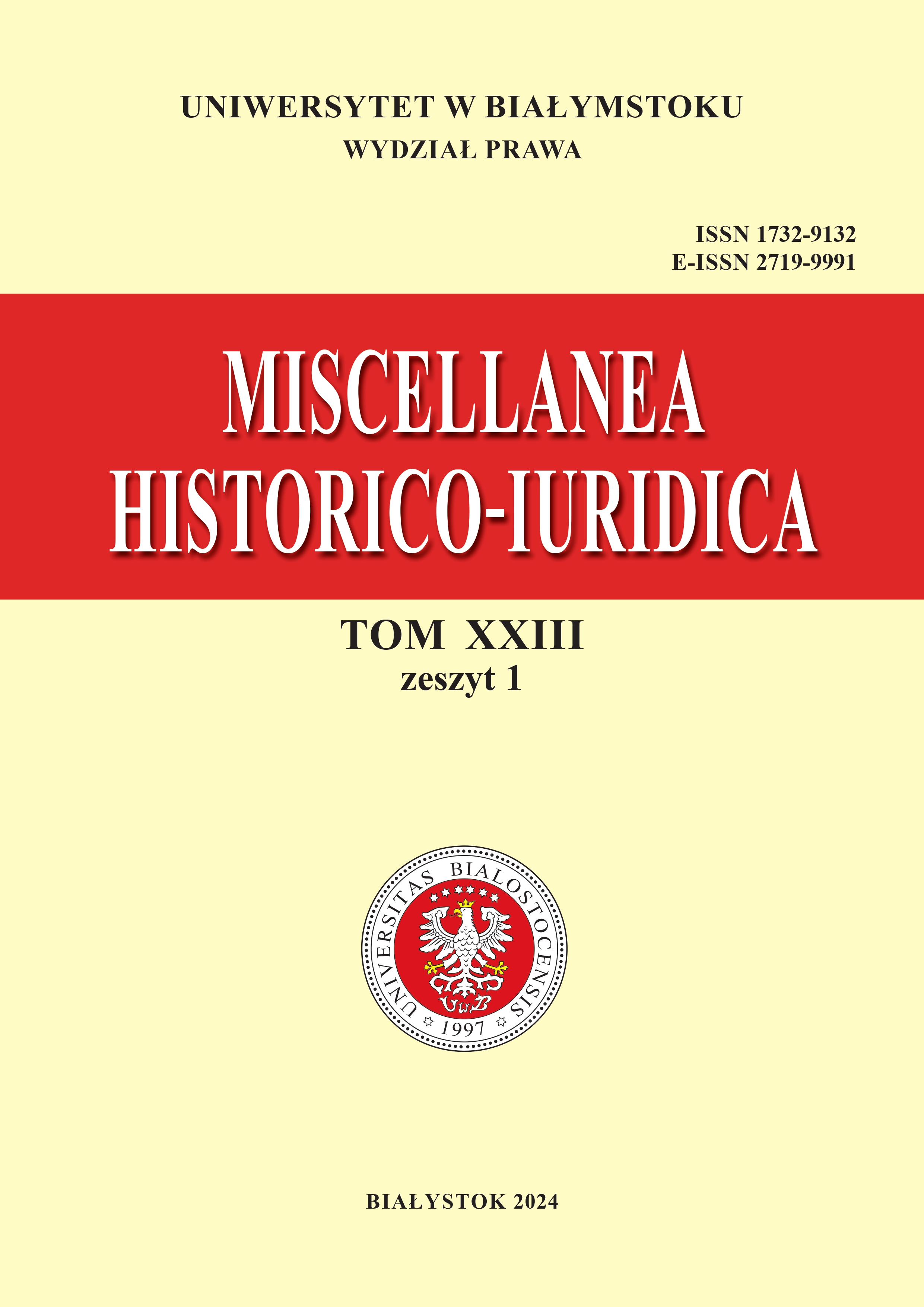Court of Arbitration of the Warsaw Money Exchange (1921-1939)
Keywords:
arbitration court, exchange, commodity and stock exchange law, interwar periodAbstract
In recent years, suggestions have been made to create a specialized court for the capital market, which would have jurisdiction over disputes that have arisen between participants in the market, as well as to introduce new special judicial procedures to, among other things, protect investors and streamline the settlement of stock market disputes. These suggestions are primarily due to the recognition of the peculiarities that characterize trade in the capital market (with particular emphasis on the stock market). Economic transactions in the broadest sense of this term are a dynamic phenomenon and, because contractual relationships constantly change and repeatedly form the basis for further transactions, disputes arising under commercial law require the quickest possible resolution. Therefore, it can be said that trade at stock exchanges is the quintessence of these dynamics and complexities of the legal relationships such trade involves, and this requires even greater efficiency and diligence in protecting the interests of its participants, including by ensuring the right of recourse to a court. In addition, the settlement of disputes arising in the capital market requires not only knowledge of procedural law, but, most importantly, expertise in the trade in financial instruments. These issues and the resulting needs were recognized long ago, soon after Poland regained its independence in 1918, when the first exchanges were established on Polish soil to operate under national legislation. The commodity and stock exchange law enacted at the time provided for the need to ensure adequate protection of the interests of exchange members by, among other things, allowing them to assert their rights in courts. Although the status of the arbitration courts established pursuant to the provisions of the law was unclear, as they were a sort of intermediate solution between a court exercising coercive powers and an arbitral court, they certainly contributed to the implementation of exchange trade participants’ right to recourse to a court and to ensuring high ethical standards in the conclusion of transactions. One such court operated between 1921 and 1939 at the most important Polish exchange of the interwar period in terms of trading volume - the Warsaw Money Exchange. The purpose of this article is to introduce this institution, also by discussing how the court was appointed against the background of the organization of the exchange and by presenting the scope of competence and the proceedings before the court. The authors also focused on presenting and analyzing data on the activities of the said institution.
References
Act of January 20, 1921 on the organization of exchanges in Poland (Journal of Laws of 1921, no. 13, item 71).
Regulation of the President of the Republic of Poland of November 29, 1930 – Code of Civil Procedure (Journal of Laws of 1930, no. 83, item 651).
Act of March 18, 1935 amending the Regulation of the President of the Republic of Poland of December 28, 1924 on the organization of exchanges (Journal of Laws of 1935, no. 24, item 163).
Regulation of September 21, 1950 on State Trade Inspection (Journal of Laws of 1950, no. 44, item 396).
Regulation of the President of the Republic of Poland of December 28, 1924 on the organization of exchanges (Journal of Laws of 1924, no. 114, item 1019).
Regulation of the President of the Republic of Poland of March 6, 1928 amending certain provisions of the Regulation of the President of the Republic of Poland of December 28, 1924 on the organization of exchanges (Journal of Laws of 1928, no. 27, item 250).
Decision of the Ministers of Treasury and Industry and Trade of November 4, 1921, on approval of the statute of the Warsaw Money Exchange (M.P. 1921, no. 271).
Decision of the Minister of Treasury in consultation with the Minister of Industry and Trade of May 8, 1925, on approval of the statute of the Warsaw Money Exchange (M.P. 1925, no. 116).
Czerniawski Ryszard, Statuty Giełdy w Warszawie, Skorpion, Warsaw 1996.
Giełda Pieniężna w Warszawie. Sprawozdanie za rok [1921–1938], Publishing House of the Money Exchange in Warsaw, Warszawa [1922–1939].
Kon Henryk W., Sąd rozjemczy giełdy warszawskiej, „Przegląd Prawa Handlowego” 1925, no. 1, pp. 35–45.
Marks Bogusław Piotr, Kwestie etyczne w prawie giełdowym okresu zaborów i pierwszych lat niepodległości Polski (do 1921 r.), „Annales. Etyka w Życiu Gospodarczym” 2010, vol. 13, no. 2, pp. 71–82.
Nowakowski Władysław, Ustawa postępowania sądowego cywilnego z dnia 20 listopada 1864 roku ze zmianami zaprowadzonemi przez najwyżéj zatwierdzone postanowienie z dnia 19 lutego 1875 r. i z objaśnieniami ułożonemi przez Władysława Nowakowskiego. Cz. 1, (Art. 1–201), Warszawa 1878.
Paneth M., Giełdy Pieniężne, [in:] M. Dąbrowski, P. Lot, eds., Dziesięciolecie Polski Odrodzonej. Księga pamiątkowa 1918–1928, Warszawa–Kraków 1928, pp. 1125–1127.
Puławski Mieczysław, Dwieście lat minęło. Krótkie opisanie dziejów giełd papierów wartościowych w Polsce, „Finanse, Rynki Finansowe, Ubezpieczenia” 2017, no. 5 (89), part 2, Rynki kapitałowe, pp. 169–190.
Wróblewski Stanisław, Giełdowy Sąd Rozjemczy a Sąd Polubowny, „Przegląd Prawa Handlowego” 1925, no. 7, pp. 375–381.
Downloads
Published
Issue
Section
License
Copyright (c) 2024 Miscellanea Historico-Iuridica

This work is licensed under a Creative Commons Attribution-ShareAlike 4.0 International License.







